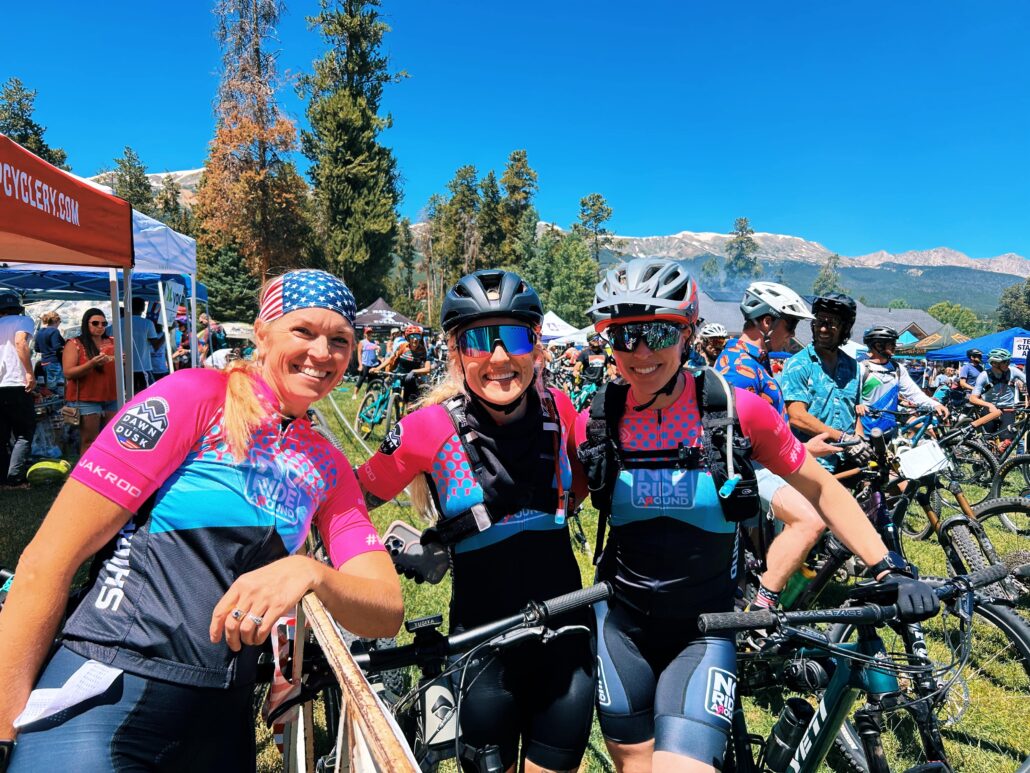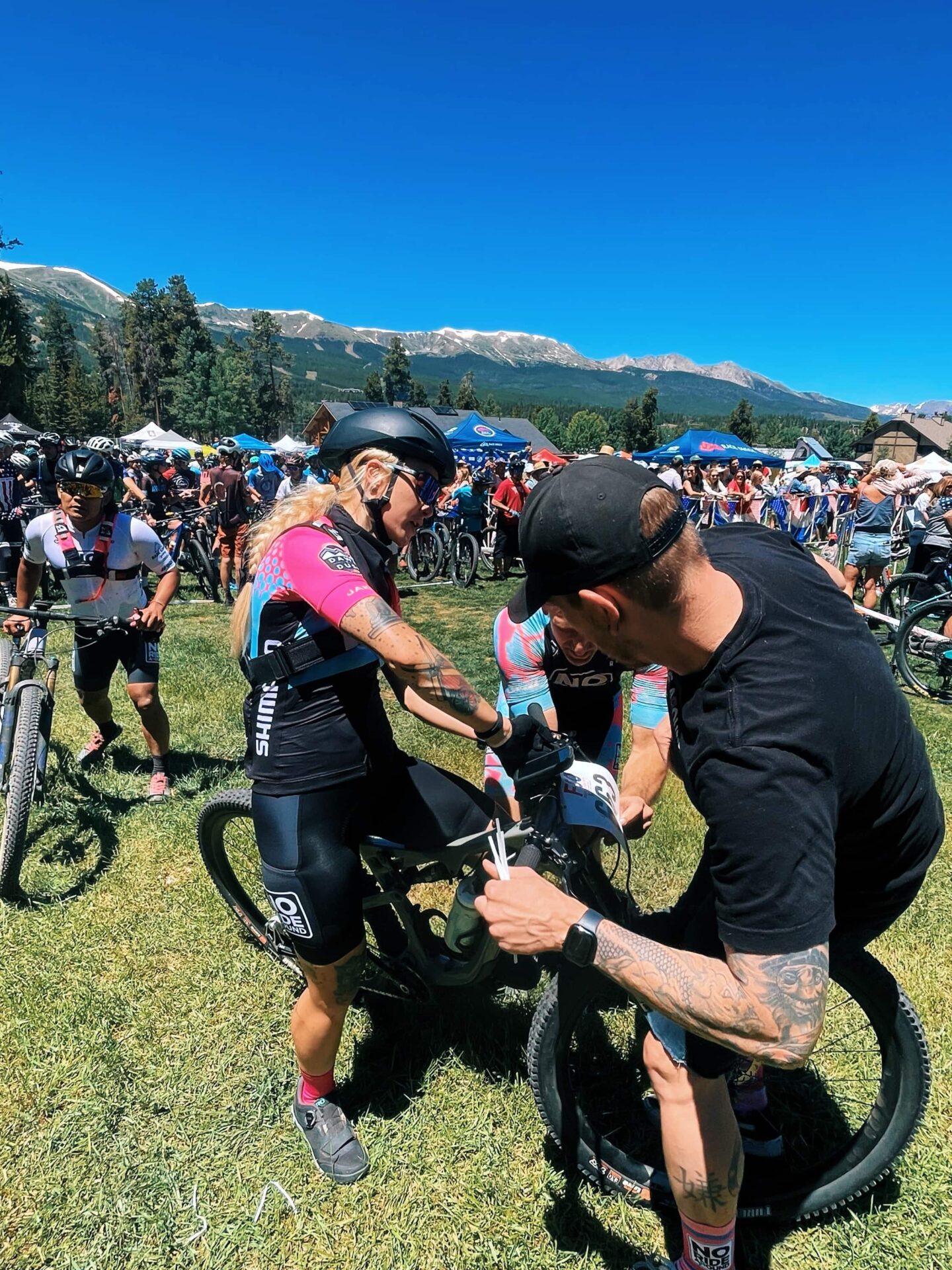I stood outside the barricades, photographing my Firecracker 50 co-ed duo teammate, Jackky, as he laughed between Laura and Rob. They were crammed in there, shoulder to shoulder, the biggest crowd of mountain bikers I’ve seen at the start of any race. Wave by wave, the racers pedaled off.
I couldn’t bear the pressure of starting for the team and fighting for position up Boreas Pass onto the single track. I wanted my more technically skilled partner, Jackky, to suffer through all that. He actually didn’t mind. “I do best first thing in the morning anyway.”
The racers led the parade as the announcer shouted company names over the speakers so all the Fourth-of-July’ers could hear who was tossing candy and launching t-shirts into the crowd.
Last year, Jackky surprised me with how fast he came back, so I knew this year I had about 90 minutes before I started warming up and 2ish hours before I had to be at the corral to switch our number plate frantically.
As I changed into my kit, I heard a familiar voice—the wife and mother of the team we’d inevitably lose to. The co-ed duo were both pros and as an unprofessional athlete with a full-time job and a 24/7 chronic disease, I already knew my time would pale in comparison. With first place definitely off the table, I wondered if we could pull off second. I guzzled my energy drink, tied my checkered shoelaces, and spritzed myself with sunscreen. Then I headed up Boreas Pass to warm up (looking behind me every few minutes to make sure I wasn’t blocking someone racing).
My legs felt like I’d just come off a heavy training block (even though I’d spent the past week tapering). If I laid my head on a pillow, I was tired enough to fall asleep immediately—the energy drink having zero effect on my body or mind. I threw in some sprints in an attempt to wake up my legs and pedaled back to the transition area, hoping adrenaline would eke out as soon as Jackky sprinted up.
As I straddled my bike in the corral, I watched racers glide down switchbacks, scouting for Jackky’s No Ride Around kit. 10 minutes went by. 20 minutes. 30. My heart rate was officially back to resting. Finally, I heard someone yell, “THERE’S JACKKY!” His head seemed like it was on a swivel—wondering why the hell I was. Colin, Rob, and I ran up to him to switch our number plate.
Rob untangled one twisty as Colin and I unwrapped the other two. Jackky walked away, letting go of his bike only for Rob to catch it last minute.
I sprinted away, back to Boreas Pass road. I tried to hold 220 watts up the climb, but my legs weren’t having it. Maybe it was my lungs. I used bikes up the road as carrots as volunteers shouted and encouraged us to “PEDAL! PEDAL! PEDAL!”
As a chronically ill athlete (for most of my life), I forget that I have something that prevents me from racing at my full capacity. The energy drink I had two hours before my turn made no difference to chronic fatigue. Caffeine usually just makes me dizzy, nauseous, and exacerbates my head pain. So does high intensity.
So there I was, at the top of Boreas Pass, turning a slight left onto the single track as my Migraine zipped and zapped its way to my temples—like little jackhammers digging for gold. It’s distracting being in that much pain, where it hurts to move your eyes. When you can feel your heart beating in your forehead. Like someone wrapped a rubberband tightly around your head.
But it was a race and I refused to let my chronic disease ruin it for me.

I carried the unnecessary pressure to PR my race time like my USWE backpack. I had to get us a good result, and by “good,” I wanted a podium. Hell, I wanted to at least do better than last year. I spun up the V3 trail—the dreaded V3 with the steep hills and technical sections after 22 miles of racing already under our belt—knowing I was so close to being done. I wanted to stop, to soft-pedal the rest of the way, but kept reminding myself: You can rest tonight. You can rest when you’ve landed on the podium.
Crossing the finish line with my new teammates yelling, clapping, and throwing their arms every which way in the air, I wasn’t sure of our results. Jackky broke the news when I came back to the team tent after my cool-down. “We came in 12th.” “Are you serious?” I asked. “How could that even happen?”
It was a worse placement than the year before. We wanted redemption from last year’s race results and came in 2 spots lower.
As other teammates crossed the finish line and gathered under our team tent, we reminisced about the course while snacking on gummy bears and watermelon, how impressed we were that the volunteers shoveled all the snow off Little Frenchy, and all the snacks and drinks the Firecracker 50 had at the aid stations; even the hand-ups so we didn’t have to stop. Even though our results sucked, the race organization and goodies are one of the best (seriously, we got free shirts and socks, a meal, and a glass to put one free beer in).
Most of us didn’t end up with the result we wanted. We all signed up for the race to win, to get on the podium, to PR, and to, you know, have type 2 fun.
It was subtle, our losses. “Hey, how’d it go?” someone would ask.
“It was good. I had a lot of fun out there,” someone would respond.
They’d innocently follow up with, “Oh yeah? What place did you come in?”
They’d answer, then quickly change the subject. “Oh, something like 12th, maybe? Did you walk or ride up Little Frenchie?”
A few of us silently got in our heads, second-guessing mountain bike racing and maybe taking up bowling or mini-golf. We tried changing the subject when we were asked about our results. We wondered where we went wrong with training or nutrition or sleep or one of the million factors that go into how you perform on race day. Yet we still found ways to laugh with each other, commiserate on the tough-as-hell-but-super-fun course, and congratulate the very few who secured a spot on the podium.
Losing in a bike race is only a finite detail on race day; it’s just one piece of the racing puzzle. You know, we talk about training and nutrition and coaching and FTPs and heart rate and all the stuff that’ll fizzle away by this time next year. Losses are as quickly forgotten as wins with enough time.
What ends up lasting are the people you grow closer to because you all endured the suffering together. The things you learn from losing hang around. The growth you experience from a loss and coming back later for revenge is what lasts. Through loss, you begin to understand what you are capable of—and if we only ever won, what would we ever learn about ourselves?
Learn about yourself and take a chance at losing. Sign up for the next Firecracker 50 here.

http://probox-club.ru/forums/index.php?autocom=gallery&req=si&img=5951
Awesome https://is.gd/tpjNyL
Awesome https://is.gd/tpjNyL
Hey guys, just checked out 777wim. Honestly, it’s pretty decent. Nothing groundbreaking, but a solid option if you’re looking for something new. I found a few cool games there. Give it a shot!